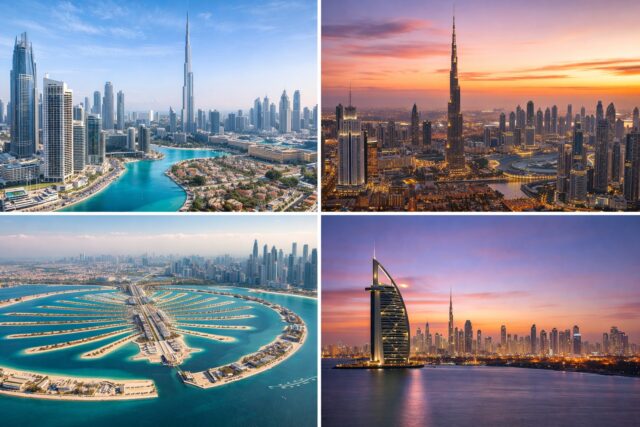
Dubai’s real estate market in 2025 is experiencing remarkable growth, driven by strategic government initiatives, a surge in luxury developments, and a heightened focus on sustainability and smart living.
Market Overview
In 2024, residential property prices in Dubai saw a significant increase of 20%. This growth is expected to moderate to an average of 8% in 2025. Notably, prime properties are projected to appreciate by 5%, maintaining Dubai’s competitive edge compared to global cities like London and New York. Additionally, 20% of homes in Dubai are now valued above $1 million, underscoring the city’s appeal to high-net-worth individuals.
Population Growth: Dubai’s population is projected to reach 4 million by 2025, fueled by a continuous influx of expatriates and government efforts to attract global talent. This demographic expansion is intensifying the demand for residential properties across the emirate.
Government Initiatives: The introduction of long-term visas and relaxed property ownership laws have significantly bolstered investor confidence. These policies have led to increased property transactions, particularly in luxury segments, as Dubai solidifies its status as a global investment hub.
Forbes
Tourism and Short-Term Rentals: With Dubai attracting over 20 million visitors in 2024, the short-term rental market has flourished. High occupancy rates, especially in areas like Downtown Dubai and Dubai Marina, present lucrative opportunities for investors in the hospitality sector.
Construction Week Online
Emerging Trends
Luxury and Branded Residences: There’s a growing demand for luxury properties, including branded residences and waterfront villas, in prestigious locales such as Palm Jumeirah and Jumeirah Bay Island. Notably, a villa priced at $134 million exemplifies the high-end market’s vibrancy.
Sustainability and Smart Developments: Aligning with Dubai’s Net-Zero 2050 commitment, there’s a notable shift towards eco-friendly and technologically advanced properties. Developments featuring green certifications, energy-efficient designs, and smart home technologies are increasingly attracting environmentally conscious buyers.
Community-Centric Living: The demand for co-living spaces and master-planned communities is on the rise. Developments that integrate residential, retail, and recreational facilities are fostering a sense of community and convenience, appealing to young professionals and expatriates.
Investment Opportunities
Dubai offers some of the highest rental yields globally, averaging between 6% and 10%, surpassing returns in cities like London and New York. Areas such as Downtown Dubai, Dubai Marina, and Jumeirah Village Circle are particularly attractive to investors seeking robust returns.
Challenges and Considerations
While the market is buoyant, challenges such as rising construction costs, potential market corrections, and global economic uncertainties persist. Investors are advised to conduct thorough due diligence, stay informed about policy changes, and consider both short-term dynamics and long-term growth prospects when making investment decisions.
Conclusion
Dubai’s real estate market in 2025 presents a dynamic landscape characterized by growth, innovation, and diversification. With strategic government initiatives, a focus on sustainability, and a thriving luxury sector, the emirate continues to solidify its position as a premier global real estate destination.




Leave a Reply